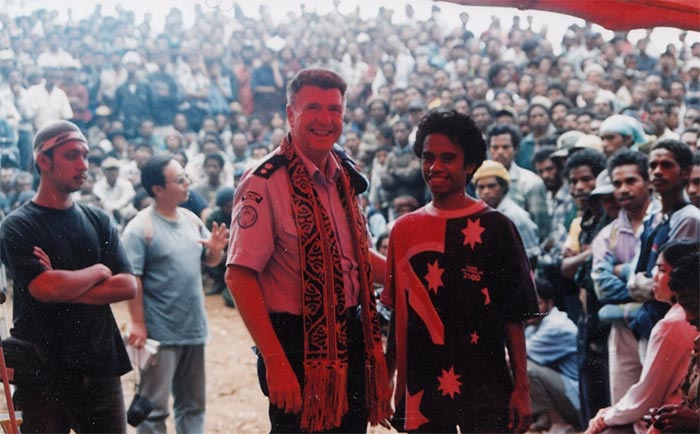Geoff Hazel

Photographer unknown. (1999). Geoff Hazel at official opening of Falantil cantonment. Photographer sourced by Geoff Hazel.
In 1999, Vietnam veteran, federal police officer and experienced UN peacekeeper, Geoff Hazel (APM) was appointed as the UN Civilian Police commander and was deployed to East Timor to lead an AFP team in the district of Ermera.
The team’s deployment was part of the United Nations Assistance Mission to East Timor (UNAMET), which was established to oversee a peaceful electoral process as the East Timorese were given the right to vote on the future independence of their nation. The referendum to accept or reject the proposed special autonomy for East Timor within Indonesia, was held on 30 August 1999.
Hazel’s contingent was awarded the Australian Group Bravery Citation for working under hazardous conditions while serving in East Timor. Geoff recalls part of his journey, which is detailed in his biography, Picture a Dry River Bed: Dangerous Days; a personal story of unarmed Aussie Coppers in East Timor in 1999. (2020, Silverbird Publishing)
“From my final night in Darwin watching a TV news report of unarmed police attending to injured locals while they were still under attack, to the problems that had to be overcome from the moment of arrival at the Dili airport, this was a very intense time for me,” he said.
“Shortly after arrival there were negotiations with Indonesian Police just to leave Dili and travel to Ermera. When I arrived in Ermera there was no settling in period, it was work from that very evening.
“Day to day activities went through a number of phases – establishing the framework; registering the population; responding to threats; planning; conducting education for the population; monitoring the campaigning period; and conducting the ballot. Staying after even though under extreme threat.
“Before the ballot there was more than one occasion UN Police in Ermera deliberately placed themselves in extreme danger to protect civilians.
“During the period immediately around the day of the vote in Ermera 14 of the 21 polling sites came under sustained and serious attack. Two locals were killed. The courage and valour of a number of the unarmed police saved the lives of many locals and saved the ballot process in the district.
“The militia attempted to take the full ballot boxes– the unarmed CivPol (civilian police) stood in front of them and saved the ballots.
“Then we stayed for another six days under constant threat before we had no choice. On our final night I received information that convinced me if we did not depart the next morning, we would have been killed the next night. I collapsed shortly after arriving in Dili and was medivaced to Darwin.”
Fellow Police Officer from the United Kingdom, Rob Walker, provided details in his UNAMET report about a difficult and dangerous ballot box pick-up at Gleno River by a UN helicopter.
What happened was about 30-40 militia, some firing weapons, tried to overrun the ballot boxes and helicopter, which was hit by several rounds.
Rob recalled seeing Geoff walking towards the middle of the riverbed and, bravely, towards the advancing militia.
“Geoff had his arms outstretched with his palms turned downwards, in a calming manner, showing that we offered no threat,” he wrote in his report.
“Rocks and stones were thrown in our direction and several of the militia waved machetes in the air. Other militia members were carrying home-made, hand-held guns (Rakitans).
“Several of the Rakitans were fired in our general direction, but as they were so inaccurate the lead shot could have gone anywhere. Although I didn’t realise at the time Geoff was shot in the arm and had to have several small lead pellets removed later that day.
“There then followed a stand-off, which lasted about 10 minutes. Around this time, arriving late (deliberately as normal) were the Brimob / Indonesian Police.”
Geoff negotiated with the Brimob to ensure the security of the ballot boxes and the UN staff and eventually, despite loud and threatening intimidation tactics by the militia, they reached agreement to load the ballot boxes which Civpols and the UN staff loaded into the chopper.
UNAMET HQ Electoral staff later made the valid point that, had the militia succeeded in destroying or ‘taking’ any of the ballot boxes, then the potential impact on the integrity of the whole voting process would have been serious.
